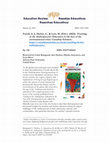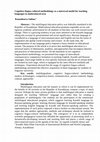Papers by Dilraba Anayatova

IJAEDU- International E-Journal of Advances in Education, 2018
This article will concentrate on questions of methodology, namely comprehension difficulties of a... more This article will concentrate on questions of methodology, namely comprehension difficulties of authentic texts. Over the past three years we had the benefit of continuing discussions with the staff and students of the Foreign Language Teacher Training Faculty at Almaty and most of what is worthwhile in this article derives directly or indirectly from them. This article is an attempt to explore certain difficulties in authentic reading that seems to us to arise from adopting a communicative approach to the teaching reading. It is the purpose of this article to reveal the reasons and causes that make reading hard and analyze the nature of errors. We must accept the commitment to propose a preparation and exploited exercises and the practical consequences of applying them as a teaching aim. The methods of the research include literature review, analysis of research cards, questioners, survey. In the study difficulties are classified into six groups according to their linguistic, semantic, syntactic, conceptual, extra linguistic features. They can be summarized as follows: a general lack of awareness about the principles of affixation, the use of expressions in a figurative sense, poor realization of metaphorical meanings of familiar words and phrases. The main aim of this article is to suggest basic rules and guidelines on avoiding errors in foreign language reading. The task before the teacher, then, is to help students change their reading habits by teaching them efficient reading strategies. An effective way to do this is through guided reading. For example, word-attack skills. These skills enable the reader to work out the meaning of unfamiliar words and phrases without looking them up in the dictionary. Here are two useful word attack skills: using context clues, and using structural information. Using context clues, includes using the meanings of other words such as synonyms and antonyms in the same sentence or paragraph, or the meaning of the sentence or paragraph as a whole, to deduce the possible meaning of unfamiliar words and phrases. Using structural information, this refers to word formation. An analysis of the stems and affixes of words can help our students get the meaning of many unfamiliar words. The meaning of the whole word can be worked out by analyzing its component parts. Reading in meaningful units, students should be able to read in meaningful units instead of isolated words. A useful way to train students to read in meaningful units is to break up a sentence into sense groups and have students focus their eyes on the middle of each sense group arranged in separate lines and try to see words on each side of the middle line. The transition of knowledge-based paradigm to competent based paradigm changed the aims and method of teaching reading. In competence-based approach which nowadays
Social sciences, Jul 9, 2024
Social sciences, Jul 9, 2024
Comparative Education Review, Aug 1, 2023

Education Review
As the global environmental crisis escalates so does the publication of books about life in the A... more As the global environmental crisis escalates so does the publication of books about life in the Anthropocene. Gaining attention of readers across disciplines and genres, these books examine the origins, impacts, and implications of living in a geological age in which the activity of some humans has permanently altered the climate and the environment of the planet. But what does the age of the Anthropocene hold for education? This urgent question is the focus of the recently published book Teaching in the Anthropocene: Education in the Face of the Environmental Crisis, edited by Alysha J. Farrell, Candy Skyhar, and Michelle Lam. It is one of the few books to date that offers practical and theoretical insights for teachers and teacher educators facing the urgent challenges of the Anthropocene in their classrooms, schools, and communities, with particular relevance for (settler) 1 colonial contexts. 1 Settler colonialism is a form of colonization whereby outsiders claim a land as their new home, displacing Indigenous peoples and establishing settler superiority through
Routledge eBooks, Feb 2, 2023

Building on the scientific evidence and keeping in focus policy promises made over the decades, t... more Building on the scientific evidence and keeping in focus policy promises made over the decades, this report mobilizes the power of socially engaged art to bring together visions and voices of youth from across the globe in a collective effort to address the root causes of the climate crisis. It starts with the premise that education is directly implicated in the climate crisis and our failure to imagine alternatives. But it can also be the catalyst for radical change. Aiming to shift and shuffle the dominant knowledge systems and categories with the cards from the Turn It Around! deck, this report urges you to turn toward the reality of the climate crisis by capturing its devastating impacts from youth perspective in a way statistical data might not. It challenges existing education policies, practices, and patterns as no longer possible, tolerable, or even thinkable. With the powerful imagination and creativity of youth, the report activates a series of turning points — intergenera...

The multilingual education policy was federally mandated in the Republic of Kazakhstan. Multicult... more The multilingual education policy was federally mandated in the Republic of Kazakhstan. Multicultural education promotes equitable access and rigorous academic achievement for all students so that they can work toward social change. There is a growing tendency to pay more attention to the Kazakh language taking into account its governmental and social significance, Russian language is considered as a language of intercommunication and English one has the status of integration into global world economy and science. At the same time, the implementation of any language policy imposes a heavy burden on educational system. The purpose of the article is to prove that multilingual education is a universal matrix of dimensions, qualities, and approaches that encompass theories and practices of educational reform. On the basement of our cognitive linguacultural methodology, we presented four stages of intercultural communicative competence formation in teaching English, Kazakh and Russian languages. Each stage fulfills its own specific functions and the set of certain skills are formed on each stage, which is equipped by the most effective methods and techniques. Experiment showed that the usage of cognitive lingua-cultural methodology promoted the effective acquisition of three languages by students of linguistic university.

Open Book Publishers, Apr 22, 2024
Drawing on collective biography, memory work, and diffractive analysis, this chapter examines chi... more Drawing on collective biography, memory work, and diffractive analysis, this chapter examines childhood memories of our entanglements with plants. By approaching research as a ceremony, our goal is to reanimate the relationships we have shared with plants and places, illuminating multiple intra-actions and weaving different worlds together. Our collective ceremony of remembering brings into focus how plants called us forward, evoked our gratitude and reciprocity, shared knowledge, and offered comfort, companionship, love, belongingness, and understanding throughout life. The process of our collective remembering and writing has turned into a series of ceremonial gatherings and practices, bringing forth vivid memories, poetic expressions, and creative drawings. As humans, we have often (re)acted to plants' generous gifts in meaningful gestures and communications that have co-created and made visible our deeply felt inter-species love and care.
Book Chapters by Dilraba Anayatova
Education, Curriculum and Nation-Building, 2023
Childhood has been historically placed at the heart of nation-building projects, linking the futu... more Childhood has been historically placed at the heart of nation-building projects, linking the futures of children to the changing visions of geopolitical, economic, and social orders. what happens to the relationship between childhood and nation when the very future it represents becomes threatened by the human-induced climate crisis in the context of the Anthropocene?

Uploads
Papers by Dilraba Anayatova
Book Chapters by Dilraba Anayatova